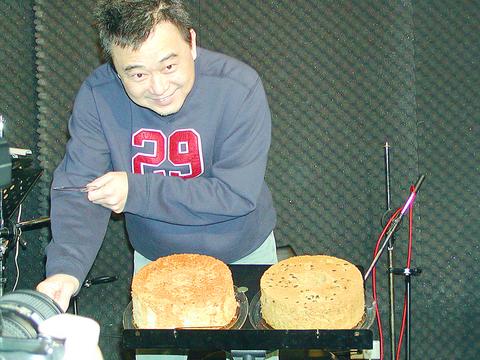As well known for his drinking as he is for his unique lyrical style, Bobby Chen (陳昇) has been intoxicating audiences in Asia with his folksy brand of music for nearly 15 years. His lengthy tenure in the industry and his ability to endure pain and avoid alcohol induced destruction have prompted some in Taiwan to declare him the Ironman of the island's music scene. It is fitting therefore, that the theme of Chen's sell-out concert at the Taipei International Convention Center on New Year's Eve is pi -- a number that never ends.
In what will be his tenth New Year's Eve performance, the Taiwanese native has made a conscious effort to create a concert experience to surpass the previous nine. For starters, he will share the stage with singer Rene Liu (劉若英) for a special performance of their popular duet, One Night in Beijing.

COURTESY OF ET-ONLINE
NT$1 million has been spent on enhancing the stage and projection screen in an effort to create a more youthful and high-tech vibe.
The most noticeable difference between this year's show and the previous nine however, may be the singer himself. Chen has yet to fully recover from injuries sustained in a alcohol-related brawl that left him near death in June. Although doctors were successful in removing blood clots from the left side of his brain, Chen is still left without the use of his right hand, which means he is unable to play his guitar.
Another integral part of the musician's act in the past -- onstage drinking -- will also be missing from this year's performance. Although the concert promoter has offered to keep the drinks flowing throughout the night, Chen has refused, presumably because he has turned his life around after the grave incident in June.
Chen will be play one concert on New Year's Eve at the Taipei International Convention Center starting 8pm.

May 26 to June 1 When the Qing Dynasty first took control over many parts of Taiwan in 1684, it roughly continued the Kingdom of Tungning’s administrative borders (see below), setting up one prefecture and three counties. The actual area of control covered today’s Chiayi, Tainan and Kaohsiung. The administrative center was in Taiwan Prefecture, in today’s Tainan. But as Han settlement expanded and due to rebellions and other international incidents, the administrative units became more complex. By the time Taiwan became a province of the Qing in 1887, there were three prefectures, eleven counties, three subprefectures and one directly-administered prefecture, with

President William Lai (賴清德) yesterday delivered an address marking the first anniversary of his presidency. In the speech, Lai affirmed Taiwan’s global role in technology, trade and security. He announced economic and national security initiatives, and emphasized democratic values and cross-party cooperation. The following is the full text of his speech: Yesterday, outside of Beida Elementary School in New Taipei City’s Sanxia District (三峽), there was a major traffic accident that, sadly, claimed several lives and resulted in multiple injuries. The Executive Yuan immediately formed a task force, and last night I personally visited the victims in hospital. Central government agencies and the

Among Thailand’s Chinese Nationalist Party (KMT) villages, a certain rivalry exists between Arunothai, the largest of these villages, and Mae Salong, which is currently the most prosperous. Historically, the rivalry stems from a split in KMT military factions in the early 1960s, which divided command and opium territories after Chiang Kai-shek (蔣介石) cut off open support in 1961 due to international pressure (see part two, “The KMT opium lords of the Golden Triangle,” on May 20). But today this rivalry manifests as a different kind of split, with Arunothai leading a pro-China faction and Mae Salong staunchly aligned to Taiwan.

As with most of northern Thailand’s Chinese Nationalist Party (KMT) settlements, the village of Arunothai was only given a Thai name once the Thai government began in the 1970s to assert control over the border region and initiate a decades-long process of political integration. The village’s original name, bestowed by its Yunnanese founders when they first settled the valley in the late 1960s, was a Chinese name, Dagudi (大谷地), which literally translates as “a place for threshing rice.” At that time, these village founders did not know how permanent their settlement would be. Most of Arunothai’s first generation were soldiers